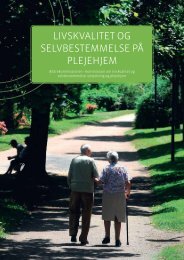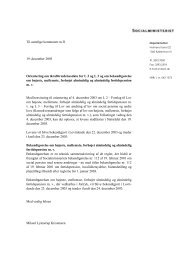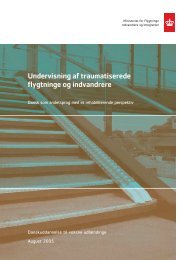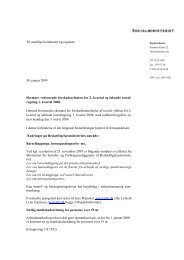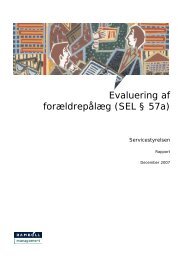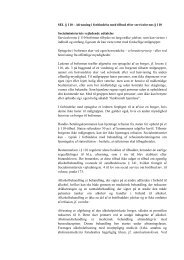Citizen in Denmark - Ny i Danmark
Citizen in Denmark - Ny i Danmark
Citizen in Denmark - Ny i Danmark
- No tags were found...
Create successful ePaper yourself
Turn your PDF publications into a flip-book with our unique Google optimized e-Paper software.
Children and young peopleFAMILYContact between parents and personnelPositive contact between parents and day care personnel iscrucial to the healthy development of the child. Personnel will<strong>in</strong>form you about what happens at the day care centre on a dailybasis. They want to hear about your experiences with the childand changes <strong>in</strong> the family that affect the child.If you need more time to speak to personnel, you can arrangefor a parent-teacher meet<strong>in</strong>g.Many day care centres employ bi-l<strong>in</strong>gual personnel who participate<strong>in</strong> the meet<strong>in</strong>gs. Otherwise you can be given an <strong>in</strong>terpreter.Parent-teacher meet<strong>in</strong>gs and boardsIt is important that you take an active <strong>in</strong>terest <strong>in</strong> your child’sdaily life, also when your child is <strong>in</strong> the care of others. You canf<strong>in</strong>d out more about what is happen<strong>in</strong>g at your child’s day carecentre and make suggestions at parent-teacher meet<strong>in</strong>gs heldtwice a year. At one of the parent-teacher meet<strong>in</strong>gs, parentselect representatives to the parent board. Representatives havea say <strong>in</strong> the centre’s f<strong>in</strong>ances, activities and the education thatimpacts on the daily lives of the children.Between two culturesIt can be difficult be<strong>in</strong>g a child or a young person if there is a greatdifference between the norms and values <strong>in</strong> Danish society andthose you have grown up with at home. And it can be difficultbe<strong>in</strong>g a parent, experienc<strong>in</strong>g society’s norms and expectationsof children and young people that are so different from thoseof your native country.TeenagersIt does not get any easier when children reach their teenage yearsand experience important physical and emotional changes. Likeall other children they must f<strong>in</strong>d themselves, learn to stand ontheir own two feet and prove that they are <strong>in</strong>dependent. At thesame time, the parents are responsible for them and cont<strong>in</strong>ueto set boundaries for their teenage children.Agreements and rulesMost young people liv<strong>in</strong>g at home reach agreement with theirparents as to what rules apply to go<strong>in</strong>g to parties, what time theyhave to be home, and if they are allowed to spend the nightaway from home. Many young people - boys and girls - meetat cafés and discotheques <strong>in</strong> their spare time or hold privateparties. Some spend the night at each other’s houses.Many parents discuss their attitudes towards smok<strong>in</strong>g, dr<strong>in</strong>k<strong>in</strong>gand parties, for example, at parent-teacher meet<strong>in</strong>gs. Individualfamilies have very different attitudes towards the rules that shouldapply and the degree of free scope afforded their children. Atparent-teacher meet<strong>in</strong>gs, parents can establish common rulesfor their children - for example, <strong>in</strong> connection with schoolparties.64





